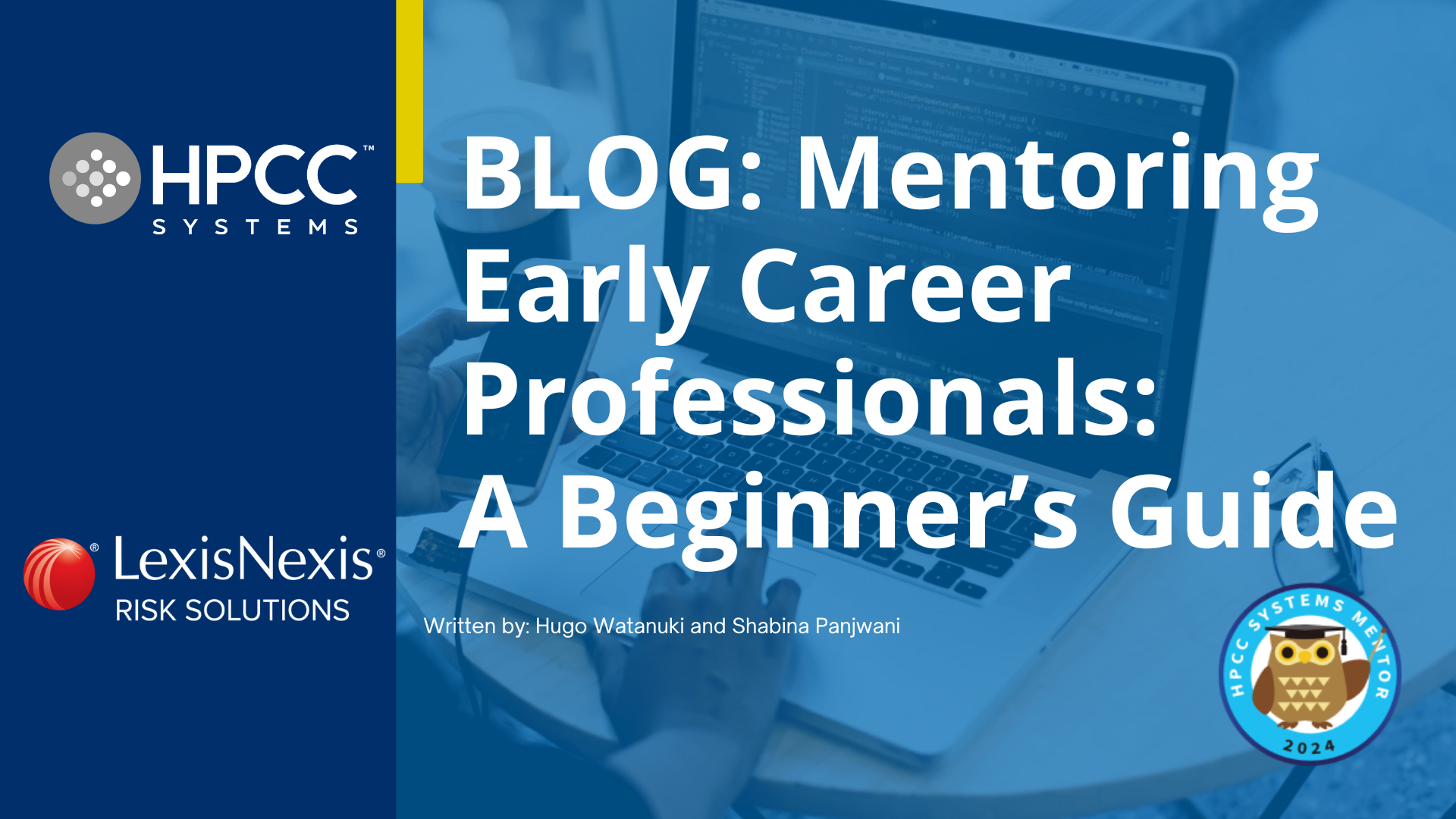
The Growing Importance of Mentorship

Over the years, the HPCC Systems Academic Program has been a steadfast supporter of emerging talent through numerous initiatives. One notable example is the HPCC Systems Summer Internship Program, which, since 2015, has helped talented students from diverse backgrounds launch their professional journeys and thrive in both academic and industry settings. You can hear more about their success stories in this panel discussion at the 2024 HPCC Systems Community Summit.
The success of the HPCC Systems Summer Internship Program is largely due to the volunteer mentors who have devoted countless hours to fostering the personal and professional growth of our students. Their dedication has played a pivotal role in enhancing students’ skills and preparing them to make meaningful contributions to society.
As a result of this incredible journey and the wealth of experience gained over the years in supporting early career programs, Hugo Watanuki, Manager Community Tech Programs at LexisNexis Risk Solutions, and Shabina Panjwani, Early Careers and DI&B (Diversity, Inclusion & Belonging) Coordinator at LexisNexis Risk Solutions, are here to share insights about the value of mentoring early career professionals. Next, they discuss how mentoring benefits both mentors and mentees, sharing experiences from various mentoring programs to demystify the role of a mentor and equip you with the knowledge and confidence to embrace this impactful experience.
Mentorship has long been recognized as an invaluable tool in personal and professional development. Today, with rapid changes in the workforce and generational shifts, mentoring is more important than ever. But why? First, let’s define who we’re talking about when we discuss “early career professionals”.
Who Are Early Career Professionals?
An early career professional can be defined as someone who is starting their professional journey, whether they are fresh out of college, transitioning between careers, or gaining new skills in a different industry. A recent Harvard Business Review article (Hall, 2024) provides a broad definition that covers anyone at the early stages of their career. This includes interns, co-op students, new graduates, and even experienced workers transitioning to new roles, such as a lawyer switching to software development.
What unites these individuals is their need to acquire knowledge, navigate unfamiliar professional environments, and establish themselves in a chosen field. If you think back to the start of your own career, you may remember the uncertainty, the questions, and the need for guidance. Mentoring plays a critical role in alleviating these uncertainties by providing support, advice, and access to a mentor’s professional network.
Why Mentoring Early Career Professionals Matters
Organizations today are increasingly recognizing the value of mentoring early career professionals. As the workforce evolves, bringing in fresh talent is essential for maintaining competitiveness and innovation. Here are some reasons why early talent is crucial for organizational success:
- New Perspectives: Early career professionals bring fresh ideas and perspectives that can drive innovation and creativity. They are not as entrenched in existing systems and can offer solutions that others might overlook.
- Diversity: Early talent often comes from more diverse and underrepresented backgrounds, contributing to a future pipeline of leaders who represent different perspectives. This diversity is vital for creating inclusive and innovative work environments.
- Adaptability: Early career professionals tend to be adaptable and open to change. This flexibility makes them valuable in fast-paced organizations where goals shift, and priorities evolve rapidly.
In addition to these points, we are also witnessing a significant change in the global workforce. As of 2024 and 2025, Generation Z (those born between 1995 and 2010) is set to comprise up to 27% of the global workforce. This shift not only affects the work environment but also highlights the growing demand for mentorship. In fact, 83% of Generation Z workers say having a workplace mentor is crucial to their career development.
Demystifying Mentorship

Now that we’ve discussed the importance of mentoring early career professionals, let’s take a closer look at the concept of mentorship itself. There’s often confusion and even hesitation around the idea of being a mentor. Many people worry they don’t have enough experience or subject matter expertise, or they feel intimidated by the responsibility historically associated with mentoring roles.
Mentorship, however, isn’t about having all the answers or being an infallible leader. At its core, mentoring is a relationship between two individuals where one person, with more experience, offers advice, guidance, and support to someone with less experience. This can include sharing knowledge, helping with skills development, and providing encouragement.
What is often overlooked, though, is that mentorship is a two-way street. Both the mentor and the mentee benefit from the experience. While the mentee gains knowledge and support, the mentor often experiences personal growth, satisfaction, and even career advancement.
The Modern Mentor’s Role
The role of a mentor has evolved over time. In historical examples of mentoring relationships, such as Socrates mentoring Plato or Freud mentoring Jung, the mentor was seen as an all-knowing figure who guided a younger apprentice through life and career. In modern times, however, mentoring is much more collaborative and dynamic. The focus is less on transferring knowledge from the mentor to the mentee and more on fostering mutual growth and understanding.
For example, research has shown that mentors not only help early career professionals navigate their roles but also benefit from exposure to fresh perspectives and critical thinking. Mentoring provides an opportunity for self-awareness and personal reflection, often revealing hidden strengths, such as listening or teaching abilities.
Mutual Benefits of Mentorship
Let’s take a closer look at the benefits of mentorship for the parties involved:
- For Early Careers: Mentorship helps early career professionals build confidence and acquire both explicit and implicit knowledge. Explicit knowledge includes technical skills, such as learning to use a new tool or software. Implicit knowledge refers to navigating workplace culture, building professional networks, and understanding corporate goals. Mentors can accelerate this learning process by introducing mentees to their own networks and helping them align their work with larger organizational goals.
- For Mentors: Personal satisfaction is one of the most cited benefits for mentors. Helping someone else grow and succeed can be deeply rewarding. Mentors also benefit from fresh perspectives, which can reignite critical thinking and innovation. Finally, the mentoring experience helps mentors become more self-aware, allowing them to better understand their own strengths and areas for growth.
- At the Organizational Level: When companies invest in mentoring programs, they often see higher levels of employee engagement and lower turnover rates. Mentoring helps foster a more inclusive workplace by creating opportunities for underrepresented employees to develop essential skills and networks.

Preparing to Be a Mentor
If you’re considering becoming a mentor, you may wonder what it takes to succeed in this role. Here are some key qualities that research suggests are essential for effective mentorship:
1. A Desire to Help Others Grow: Mentors should have an intrinsic motivation to support others. This goes beyond professional advice—mentors must genuinely care about their mentees’ development.
2. Leadership Skills and Subject Knowledge: Mentoring often involves guiding someone through specific tasks or projects. While mentors don’t need to be experts in everything, they should have enough experience in the relevant areas to provide meaningful guidance.
3. Enjoyment of Teaching: Mentorship involves a degree of teaching, whether it’s explaining a concept, offering feedback, or helping the mentee develop new skills. Mentors should enjoy this aspect of the role.
4. Time Commitment: Mentoring does require time and attention. While it doesn’t have to be a full-time commitment, mentors should be prepared to dedicate regular time to the relationship, whether that’s through weekly check-ins or more structured meetings.
Embracing Generational Differences in Mentoring
Finally, as the workforce continues to evolve, it’s also important to recognize the different expectations and preferences of younger generations. For instance, Generation Z workers often value purpose in their work and want to make a difference. They also prioritize work-life balance and prefer environments with minimal hierarchy. Understanding these generational traits can help mentors create more effective and fulfilling relationships.
Here are some example behaviors that mentors can embrace to help Generation Z workers:
– Providing meaningful projects that allow them to see the impact of their work
– Encouraging realistic goal setting and managing expectations
– Fostering an inclusive environment that values equal participation
– Supporting a flexible work-life balance
Conclusion

Over the years of supporting mentoring programs, we have consistently witnessed both mentors and mentees report overwhelmingly positive experiences. Early career professionals emphasized how their mentors helped simplify complex tasks and fostered psychologically safe work environments. Mentors, in turn, expressed how refreshing and rewarding it was to guide someone through their career journey.
Mentoring early career professionals is a win-win situation for everyone involved. Not only does it help new workers navigate the complexities of their roles, but it also allows mentors to grow, learn, and find personal satisfaction. For organizations, mentoring can lead to higher engagement, a more inclusive culture, and lower turnover rates.
If you’ve ever considered becoming a mentor, now is the time to take that step. By mentoring, you’ll play a vital role in shaping the next generation of professionals while also gaining valuable insights and experiences yourself. So, as you reflect on this blog, ask yourself: are you ready to mentor the next wave of early career professionals and contribute to a thriving, inclusive workplace?
Meet the authors

Hugo Watanuki
Manager Community Tech Programs,
LexisNexis Risk Solutions
Boca Raton, USA

Shabina Panjwani
Early Careers, Diversity Inclusion & Belonging Coordinator,
LexisNexis Risk Solutions
Alpharetta, USA
References
De Witte, M. (2024). 8 ways Gen Z will change the workforce. Available at: https://news.stanford.edu/stories/2024/02/8-things-expect-gen-z-coworker.
Hall, J. (2024). How to Help Gen Z Early-Career Professionals Navigate Their Careers. Available at: https://www.harvardbusiness.org/how-to-help-gen-z-early-career-professionals-navigate-their-careers/. Terrazas, A. (2023). Glassdoor’s 2024 Workplace Trends. Available at: https://www.glassdoor.com/blog/workplace-trends-2024/.
Walton, G. M., & Cohen, G. L. (2007). A question of belonging: Race, social fit, and achievement. Journal of Personality and Social Psychology, 92(1), 82–96. https://doi.org/10.1037/0022-3514.92.1.82.
